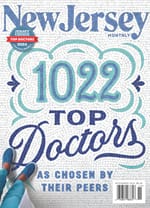As the Covid-19 pandemic raged, nurses across the spectrum of medical care stepped up with compassion, dedication and high standards to support patients, their families and each other. In this, our sophomore offering of Excellence in Nursing, in partnership with the DAISY Foundation, we pay tribute to 242 exceptional health care heroes from New Jersey in more than 94 practice specialties at more than 70 participating hospitals and facilities. Click here to view the complete list of 2020 DAISY Award honorees.
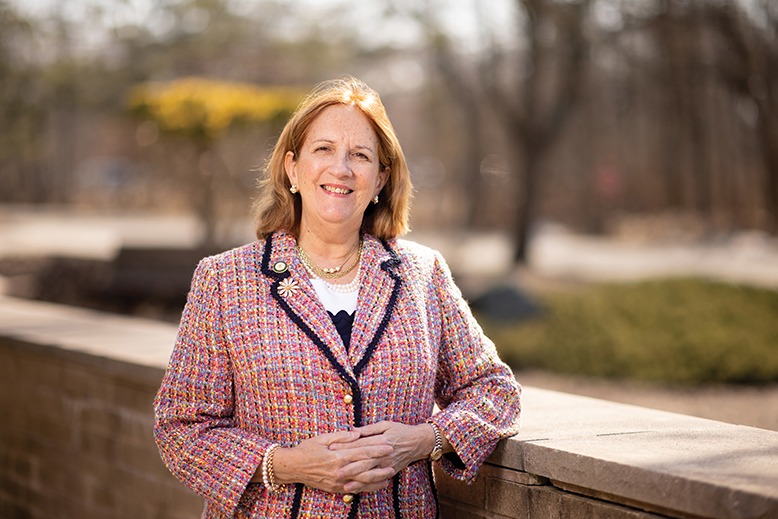
Maureen Schneider Photo by John O’Boyle
Maureen Schneider • PHD, MBA, RN, CPHQ, FACHE
CHIEF NURSE OFFICER AND HOSPITAL OPERATIONS
Chilton Medical Center, Pompton Plains
Lifetime Achievement Award
For Maureen Schneider, a career in nursing was second nature. Growing up, she accompanied her mother, who was a nurse, to the hospital, where she had her first exposure to the helping spirit of the profession. “I witnessed how much the nurses genuinely cared about people, how hard they worked and how committed they were to what they did,” says Schneider, who realized early on, that she didn’t want to do anything else. “My mother said, ‘You can never go wrong with nursing.’”
Schneider, taking that advice to heart, first worked as a bedside nurse, and continually increased her education and responsibilities. In time, she rose through the ranks—and raised the bar for research, standards and practices in the profession. “Education is the foundation of nursing. I knew that the more I learned, that knowledge would broaden my view and give me a greater understanding of why we do what we are doing,” she says.
With education, advocacy and research as her building blocks, Schneider is always looking for ways to better serve patients, fellow nurses and the hospital. She has spent her career spearheading committees and creating policies that are staples in the organizations they serve. From system-wide nursing committees to electronic documentation processes to recruitment and retention standards, Schneider leads by example, implementing practices that support her staff and are models for other institutions.
With a career spanning several decades, Schneider has witnessed—and been a part of—nursing’s evolution. While the profession now places an even greater emphasis on education and clinical protocols, the heart of the job remains the human element. Patient care is always at the forefront of Schneider’s work. The importance of clinical protocols and standards was never more evident than at the height of the pandemic.
“This year, we’ve seen the frontline heroes at the bedside, implementing protocols as needs were presented,” says Schneider. “Nurses became many patients’ only contact with their family. Family members were exhausted and frightened, and nurses took it upon themselves to reassure them. They set up Skype calls to help alleviate the isolation,” she says. “Using technology to bridge the gap has now become standard practice in our hospital; every unit has access to iPads.” They even set up special stands to make it easier for patients to view the iPad screens.
In the throes of the epidemic, Schneider’s hospital saw more than 150 Covid-19 and critical-care patients. “People did extraordinary things,” says Schneider. “It was a huge effort from every hospital worker—from housekeepers to doctors and technicians.” —Deborah P. Carter
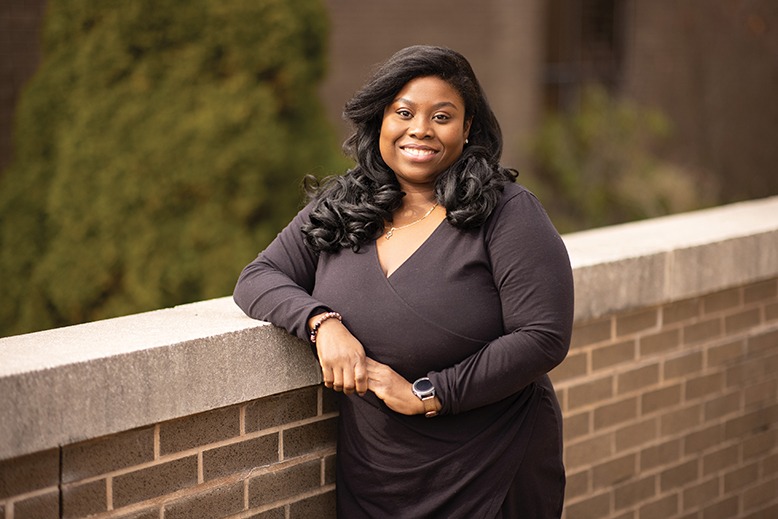
Leocadie Toussaint Photo by John O’Boyle
Leocadie Toussaint • BSN, RN, PCCN
TELEMETRY
Hackensack Meridian Health—JFK University Medical Center
For Leocadie Toussaint, becoming a nurse was one of the easiest decisions she ever made. The oldest of four, Toussaint’s passion for caring for people goes back to her childhood. The Rahway resident, who moved to New Jersey from Haiti with family when she was eight, attributes her nurturing nature to her upbringing. “In Haitian culture, young women help out,” she says, adding that nursing careers also run in her family. “My aunt in Haiti is a missionary nurse. My godmother’s a nurse. I was around it all the time,” she says.
In Toussaint’s unit, telemetry, she often sees cardiac patients, including those who have had heart attacks or suffer from chest pain and respiratory issues. When the pandemic hit, her unit became a Covid-19 floor. For Toussaint, making personal connections and having one-on-one conversations to help keep patients and their families informed is one of the most rewarding parts of nursing—something Covid-19 stripped away.
“We lost that personal touch—everyone did,” she says, recalling that difficult period, March through September. Now, her unit is on the path back to normalcy, and according to one of her patients, Toussaint is as caring as ever. “I truly believe Leo went so far above and beyond to ensure my wellness,” the patient said in a letter. “She showed me great mercy and respect that I will never forget.” —Shea Swenson

Christopher Timbol Photo by John O’Boyle
Christopher Timbol • RN
EMERGENCY DEPARTMENT
Capital Health Regional Medical Center, Trenton
All emergency rooms require a broad set of skills to handle the range of health crises that come through their doors. “No matter what day it is, you never know what you’re going to get,” says Christopher Timbol, an ER nurse for the last 15 years. “You have to embrace the roller coaster,” says the 39-year-old Hamilton resident. “People that come to the emergency room need our help. It’s only fair to never assume—and give every patient my best efforts for recovery.”
Timbol brings that hands-on, positive attitude to every patient. Some require acute care—after an accident, for example. In other cases, chronic medical issues bring patients back again and again. One patient Timbol encountered suffered severe headaches for more than 10 years. From experience, Timbol knew it was important to mitigate the noise and bright lights that can exacerbate headaches. He also tried to manage the patient’s stress by prepping him so that medication could be expedited as soon as the doctor’s orders were ready. In this way, Timbol was able to anticipate the patient’s needs, soothe him, and provide reassurance about his treatment.
The desire to be a caregiver and work with the public led Timbol into nursing. “Pursuing nursing meant I was able to help a wider variety of people in so many different ways,” says the Old Bridge native, who received his degree from UMDNJ in 2006.
Today, Timbol is in a leadership role in the emergency department, teaching less experienced nurses what he has learned over the years. “To be a source of influence [with newer nurses] to make sure patients get the correct care is so satisfying,” he says, “because you know you’re helping future patients, as well as the present ones.” —Olivia Beach

Anh “Nicki” Le Photo by John O’Boyle
Anh ‘Nicki’ Le • RN
MEDICAL-SURGICAL III
Newark Beth Israel Medical Center, Newark
Anh “Nicki” Le recognized her inclination to help others at an early age. When given the option to transfer to the Intensive Care Unit of Newark Beth Israel Medical Center in November, she knew she had to take it.
Born in Virginia, Le, 29, is the daughter of Vietnamese immigrants. The family moved around the East Coast for her father’s construction job until settling in New Jersey in 2006 to assist Le’s sisters with their salon businesses.
Now, New Jersey is the place she relates to best. “My teenage years were in Jersey; it’s the place I feel most at home,” she says. “I went to school here; all my close friends are here.”
With the help of her two sisters, Le often found herself translating instructions to her parents after family doctor visits. “I had to learn to help with diet and other modifications. This sparked my interest to become a nurse, but also to get a better understanding of health care,” Le says.
She earned a bachelor’s degree in public health at Rutgers University, then promptly enrolled in Trinitas School of Nursing. She graduated from Trinitas in May 2019; shortly after, she received a bachelor of science in nursing from Chamberlain University. The following September, Le started her career in the medical-surgical unit at Beth Israel.
Today, Le works in the ICU, where she handles a broad array of tasks. “What’s different about working in the ICU is that it’s very hands-on,” Le says. “Nurses interact with patients more and treat anything from neurological issues to respiratory and cardiac issues.”
Despite focusing on different kinds of illnesses, Le makes a special effort to individualize care to ensure patient comfort. “Sometimes just holding the hand of a patient helps,” Le says. In the ICU, a goodbye is the goal, as it means Le and her team have successfully treated a patient.
Watching an intensive-care patient leave the unit is a joyful moment; it was especially rewarding during this pandemic year. At the forefront of the Covid-19 crisis while working in the medical-surgical unit, Le says the environment was nothing short of organized chaos. Le and her team often felt defeated because of the high volume of patients transferred to the ICU. However, the crisis gave Le the chance to become an ICU nurse—and she stepped up to the challenge.
“The job can be heartbreaking,” Le says, “but when you have a patient get better and they are able to personally thank you and get transferred out of the ICU, it is the best feeling in the world.” —Olivia Beach
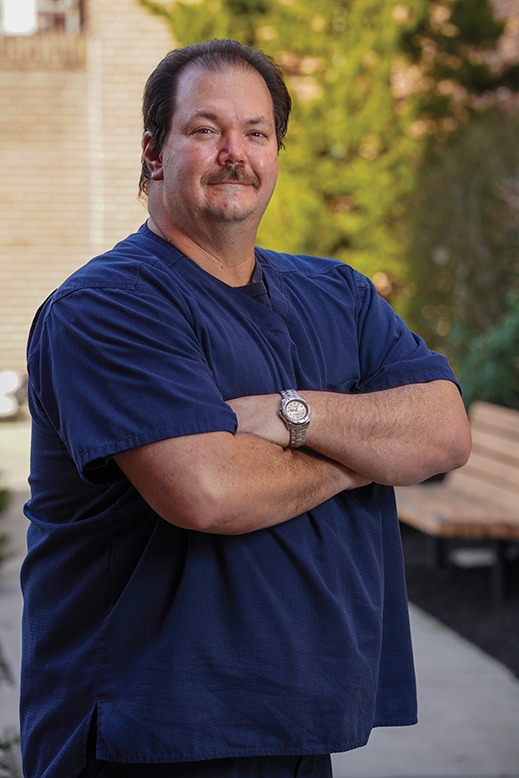
Arthur Matthews Courtesy of Inspira Health/Michael Ein
Arthur Matthews • RN
BEHAVIORAL HEALTH
Inspira Medical Center, Woodbury
A career in nursing wasn’t always a part of Arthur Matthews’s plan. In fact, he was 15 years into a career in highway construction before becoming a nurse crossed his mind. The idea crystallized when his son was diagnosed with juvenile diabetes at age six. “Seven days I was there in the hospital 24/7, and it just opened my eyes up to nursing. The things I saw the nurses do were incredible,” says Matthews.
The West Deptford resident went back to college to pursue a new path in nursing. He originally focused on pediatrics, but when an opportunity opened up in behavioral health, he made the move. It was an instant fit.
Watching his patients’ journey back to health is what keeps Matthews going. “To see the changes people go through while they’re here, what the mind can do, it’s incredible,” he says.
Whether he is working with the voluntary or involuntary patients he sees within the unit, Matthews strives to make them feel comfortable and safe, treating them with the compassion and care he would afford his own family or friends. And patients take notice. “I thought that throughout my stay I was going to be miserable, but Art changed that,” one patient wrote in a letter. “Just his being and presence brought all the positive vibes my way.” With Matthews, this patient says, “I found we were both laughing rather than me crying.” —Shea Swenson
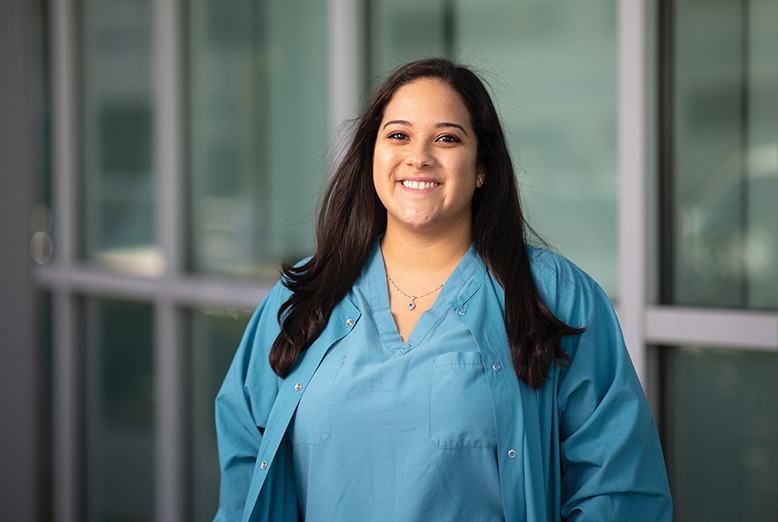
Evelyn Rendon • RN
LABOR-DELIVERY
Trinitas Regional Medical Center, Elizabeth
Being in a supportive role to medically assist in a birth provides an exhilaration of which Evelyn Rendon never tires. “Being with families at what is conceivably the most rewarding moment of their lives” never gets old, says Rendon, 32. She has worked in Trinitas Regional Medical Center’s labor and delivery department for 3 1/2 years.
“Growing up, I thought I’d like to be a teacher,” says Rendon. “I’m a people person and wanted a career where I could help people.” After graduating from JFK Medical Center Muhlenberg Harold B. and Dorothy A. Snyder Schools, she started her nursing career at an assisted-living facility. She eventually worked in the observation unit with medical/surgical and telemetry patients. Even though she enjoyed the variety of experiences those areas offered, “I wanted L&D,” Rendon says. “It can be hard to get into that unit, because once nurses get in, they never want to leave.”
The work is rewarding, even in the most difficult cases. Best of all, you help patients navigate a happy, yet potentially frightening, chapter in their lives. Even the most difficult moments, which no one wants to think about, have helped Rendon harness a compassion that serves when the unthinkable happens: fetal demise. “No one wants to talk about this, we dread it,” she says. “It is an awful thing if the best moment you are anticipating becomes the worst moment you can imagine.”
It is a precarious balance for nurses to care without revealing their own vulnerability in an inappropriate way. “A lot of nurses put up a wall—they have to. I understand that. They want to protect themselves, their own hearts. It can be psychologically so much; same with end-of-life care.” But, says the Puerto Rican–born nurse, whose fluency in Spanish has been an asset in the majority Latinx community she serves, “I strive to be 100 percent about the patient—especially this last year, when familial support had to be limited because of Covid-19. That means connecting with patients at a personal level—especially when things are not going well.”
“It’s a really vulnerable time, even when everything goes right. No labor is the same. I have a very expressive face,” she says. “I make sure it says, We’re going to get through this—whatever the challenge.” —Deborah P. Carter
